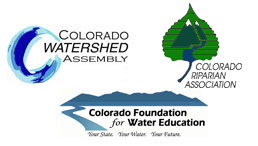1. Nonpoint Source & Data Management Workshop
Colorado Department of Public Health and Environment, eRAMS, and Colorado Water Quality Monitoring Council
8:00am to 11:30am
This year's workshop will be split into three sections, where a topic will be presented by each of the partnering organizations for about an hour, after which there will be time for participants to practice on their laptops while having some one-on-one time with presenters. Bring your laptops! More information will be coming soon.
The schedule for the workshop will be as follows:
8:00 to 8:30am: Refreshments
8:30 to 9:20 am: Nonpoint Source Program Session by Bonie Pate, Christa Trendle, and Matthew Kovach, CDPHE
The Colorado Nonpoint Source program is again offering the NPS workshop. The workshop covers topics of interest for folks who might be planning to or might already be addressing nonpoint sources of pollution. The Colorado NPS program offers funding primarily for implementation of structural best management practices that reduce NPS pollution in water quality impaired watersheds. The workshop is an opportunity for NPS program staff to present program and project specific information and for folks to interact with staff for additional information and technical assistance. The series of modules will cover topics such as program strategy update, proposal development and planning for NPS projects. The Colorado NPS program team will deliver the presentations and be available for one-on-one discussion during the workshop and during the conference. Drop-ins are welcomed. Coffee and other breakfast refreshments will be provided to participants.
9:30 to 10:20am: eRAMS - Watershed Restoration Assessment and Planning (WRAP) Tool by Dr. Mazdak Arabi and Tyler Wible, CSU
Watershed protection programs aim to maintain or restore the physical, chemical, and biological integrity of waterbodies. The development and implementation of these watershed plans require analysis of watershed conditions which are both spatially and temporally variable. Therefore, assessment of current and historic data and information is vital for continuously updating management plans in response to changing land use, climate, and watershed conditions.
The Watershed Restoration Assessment and Planning (WRAP) tool is used to extract, organize, and analyze data and information at various watershed scales, including HUC 12, HUC 10, and HUC8 levels, for readily available geospatial characteristics as well as water quantity and quality. These characteristics include current and historic land use, population, climate, climate projections, stream discharge, and stream water quality to name a few. The integrated assessment of watershed health is then broken down into six primary attributes; landscape condition, habitat, hydrology, geomorphology, water quality, and biological condition. Utilizing the extracted data, the WRAP tool calculates a number of indicators for these attributes (e.g. median summer nitrate concentration as an indicator of water quality) to create an overall summary of the watershed condition. This overall condition can then be used at a state-wide scale to prioritize management actions of the state’s watersheds. The tool will be demonstrated for water quality management use in the South Platte River Basin (SPRB) in Colorado.
10:30 to 11:30am: Colorado Water Quality Monitoring Council and the Colorado Data Sharing Network by Linda Chynoweth and Phil Russell, CWQMC
The Colorado Water Quality Monitoring Council/Colorado Data Sharing Network (CWQMC/CDSN) will be presenting the fun ways of looking and working with data during the pre-conference workshop when anyone is using the Colorado Data Sharing Network (CDSN). The CDSN has three major available tools that anyone can use to find water quality data in an area of interest. These three tools are the Ambient Water Quality Monitoring System (AWQMS) data management system, Google mapper and web GIS.
2. CFWE Water Educator Workshop
Kristin Maharg, Colorado Foundation for Water Education and Kate McIntire, Colorado Water Conservation Board
8:30-11:30am
Basin roundtables, educational institutions, utilities, government agencies and non-profit groups who are invested in water-related education – join your statewide network of peers and the Colorado Foundation for Water Education for their annual workshop. Today you will gain a better understanding of the education and outreach components of Colorado’s Water Plan and create new thinking and momentum towards implementing the actions in Chapter 9.5.
Take a look at the workshop's draft agenda here.
3. Update for Watershed Coalitions (Invite Only)
DOLA and COCO Inc.
8:30 to 11:30am
There will be more information on this workshop soon!
Thursday Morning Workshop
Camp Hale
9:30am to 12:30pm
On Thursday, October 8th, the Colorado Riparian Association will proudly present the 2015 Sustaining Colorado Watersheds Conference Field Workshop to be held at Camp Hale. The workshop will feature National Forest Foundation and USFS White River National Forest speakers to discuss the history, hydrology, and upcoming restoration work for the Camp Hale site. Camp Hale is located between Red Cliff and Leadville in the Eagle River valley and was a U.S. Army training facility constructed in 1942 for the 10th Mountain Division. Soldiers were trained in mountain climbing, Alpine and Nordic skiing, cold-weather survival as well as various weapons and ordnance. When it was in full operation, approximately 15,000 soldiers were housed there. Additionally Camp Hale has variously served as a WWII Prisoner of War Intern Site, a CIA Training Site for Tibetan Guerillas, and a Youth Training Center. Today is a National Historic Site and is being restored to improve watershed viability and ecosystem function.
Anticipated speakers and topics include:
Aaron Mayville, USFS – Overview/Cultural History of Camp Hale
Mark Weinhold, USFS – Hydrology/Fluvial Geomorphology of Camp Hale River Restoration
Jonathan Lowsky, Colorado Wildlife Science - Avian Ecology
Corey Engen, FlyWater – Macro-invertabrates
Gil Barth, S.S. Papadopulos and Associates – Ground Water
Randy Mandel – Willow / Sedge propagation



